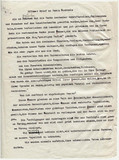Georg Kaiser’s membership card, issued by the Reichsschrifttumskammer (Reich Chamber of Literature)
Georg Kaiser’s membership card, issued by the Reichsschrifttumskammer (Reich Chamber of Literature)
Georg Kaiser ist nicht Emigrant, sondern wohnt meines Wissens immer noch in Grünheide in der Mark. Kaiser wird als Mitglied 11160 meiner Kammer geführt. Das Bühnenschrifttum Kaiser’s war bis zur Machtübernahme ein sehr ausgedehntes und umfaßt etwa 30 Stücke […]. Das gesamte Schrifttum Kaiser’s ist seit Jahr und Tag verschwunden, weil es allzu sehr mit der Systemzeit verknüpft war und im Dritten Reich keine Geltung mehr haben konnte. (Reichsministerium für Volksaufklärung und Propaganda, Abteilung II A)
[Georg Kaiser has not emigrated; to the best of my knowledge, he still lives in Grünheide (Mark). Kaiser is member number 11160 of my Chamber. Before the National Socialists came to power, Kaiser wrote extensively for the stage and his oeuvre encompassed around 30 works [...]. All Kaiser’s writings disappeared years ago, because they were too closely linked with the System and could no longer be valid in the Third Reich. (Reich Ministry of Public Enlightenment and Propaganda, Department II A) (trans. ed.)]
Reich Ministry of Public Enlightenment and Propaganda on Georg Kaiser, 1938
On 5 May 1933, Georg Kaisers was excluded from the Prussian Academy of the Arts. The NSDAP newspaper Völkische Beobachter had previously anathematised the famous Expressionist dramatist, claiming that the play Der Silbersee [The Silver Lake], set to music by Kurt Weill and successfully premièred in Leipzig in February, was “un-German” and “cultural Bolshevist” propaganda. This makes it all the more astonishing that the Reichsschrifttumskammer (Reich Chamber of Literature) issued Kaiser a membership card signed by its president Hanns Johst as late as 1936. Was this a final attempt by the regime to bureaucratically exploit Kaiser for purposes of Nazi cultural policy, even though he had been publicly denigrated and ostracised? Werner Mittenzwei reports that Propaganda Minister Joseph Goebbels and Hermann Göring would have liked to win Georg Kaiser over to their side because of his work Die Bürger von Calais [The Burghers of Calais]. However, the membership card did nothing to change the writer’s hostile attitude towards National Socialism: Kaiser was known to maintain contact with resistance groups and to have pamphlets distributed. Having received prior warning that his house was to be searched by the Gestapo, Georg Kaiser fled via the Netherlands to Switzerland in July 1938.
Further reading:
Mittenzwei, Werner: Exil in der Schweiz. Frankfurt am Main: Röderberg-Verlag 1979, S. 267-281.
Kunst und Leben. Georg Kaiser (1878–1945). Hg. von Sabine Wolf. Berlin: Akademie der Künste 2011.





![Manuscript: Georg Kaiser, Das Floss der Medusa [„The Raft of the Medusa“] Manuscript: Georg Kaiser, Das Floss der Medusa [„The Raft of the Medusa“]](/KIE/Content/EN/Images/objects/kaiser-georg-das-floss-der-medusa-manuskript-en.jpg?__blob=thumbnail&v=4)

